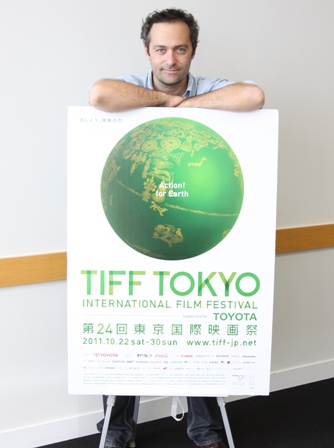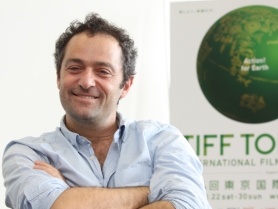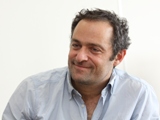Competition “A Better Life”
Interview with Cédric Kahn (Director)

Life always moves on, so I want my main character to live freely throughout his life.
Since his sensational debut with “Bar des Rails” (1991), director Cédric Kahn, born in 1966, has continuously directed controversial films including Moravia’s film adaptation of “L’Ennui” (1998), which became a hot topic for its explicit scenes and “Roberto Succo” (2001), which depicted a furious and short life of a serial killer. He is now considered as one of the most prominent filmmakers in France. His new film, “A Better Life,” portrays a central character who dreams of running a humble restaurant with his lover from Lebanon and her child, but runs into difficulties due to his debt for its opening, and then finally finds a glimmer of hope in an affectionate, but realistic way.
—Why did you title the film, “A Better Life”? The lives of protagonists become worse although they seek for a better life.
Director Cédric Kahn: Seeking for a better life is their ultimate goal and dream. In hope of them finding this at the very end of this film, I chose this title. In fact, the title includes a criticism of capitalism. A slogan of capitalism is to have “a better life.” The presupposition is that if you work harder, you will have a better life. However, sometimes borrowing money to achieve that dream of having a better life will get you caught up in hell of the debt.
—About the protagonist stealing at the end of the film, you described the action as “voler le voleur” (steal from a thief).
Kahn: It is a fact that that the needy are more exploited in various levels in life and social systems. The bank loan system puts impoverished people further down the hole.
—When you made the film, you had to talk with a bank. Have you ever had a moment where you wanted to call out to bankers who financed you, “You thief!” (Laugh).
Kahn: There is a producer between money and myself. Therefore, I do not need to directly contact a bank. But, bankers are not donors with good intentions (laugh). When banks invest money for film productions, they obviously expect returns. Although film producers spend years developing a project that always has risks, banks take all the upside. Film business is not an easy business.

— I was very impressed by this originally humble protagonist when he fought against the social system by “stealing from a thief.”
Kahn: But some audiences did not like the idea of him risking himself by committing a crime just to go abroad. I guess everyone has different moral outlooks.
—Even if the protagonist steals money from the loan shark, since the loan shark is involved in a murky business, the police wouldn’t come after the protagonist?
Kahn: A loan shark cannot claim to the police that he was robbed because the money was obtained illegally in the first place, but he can claim he was assaulted. Nevertheless, that kind of person does not solve his problems with the help of the police. They use their own men to handle it. The protagonist cannot live under the social system, which means both the law and the police cannot protect him. He has no choice but to commit a crime for the sake of his survival.
—In the middle of the story, a child shoplifts a sneaker. The protagonist scolds the child, “No theft in my house.” Ironically, he himself becomes a theft in the end. But as you said, in his case, the act of theft is justified.
Kahn: A child does not understand the social rule. He needs to be first taught that nothing can be bought without money. A grown-up protagonist understands that, but ignores the rule and steals in order to survive.
—The French word “voler” means “to steal” and has an alternative meaning “to fly.” The main character had to steal in order to fly to Canada. Were you intentionally trying to tie the two words, stealing and flying, when you were writing the film? In your previous film, “L’Avion” (2004), the protagonist steals back a plane from the military lab and flies into the sky.
Kahn: I have never been aware of the linkage of the two meanings. But for me, “stealing” and “flying” are strongly related to “freedom” and I wanted these behaviors to symbolize the protagonist’s freedom. Nevertheless, the two meanings were not in my mind.
—The scene in the beginning of the film, where a child launches a radio-controlled helicopter toy, by the lake, into the sky is a symbolic scene of “flying.” Although a child tries multiple times, the helicopter crashes down repeatedly. This scene also seems to symbolize the subsequent occurrences.
Kahn: In French, there is a phrase, “Mon reve tombe à l’eau” which means “dream failed.” But I did not use it as a metaphor this time. In the original scenario, the scene was supposed to be a child trying to manufacture a raft by a river and it starts sweeping away. As he seeks for the raft, he finds an abandoned house, which symbolizes a child play leading up to a grown-up dream.
However, we could not find an appropriate river for the location. Instead, we found a lake but a raft cannot be swept in a lake, so we changed the scene to a helicopter toy flying into the sky and crashing near an abandoned house. That scene was really a coincidence. There are coincidences in the film production. Sometimes a simple coincidence, or sometimes it’s done unconsciously and we notice later on.
—Quite a bit of car speeding scenes were used in your previous films. And many of which ends in a catastrophic event (laugh). Images of heading straight to the catastrophic result and speeding cars lap over each other. However, in this film, a poor protagonist has to sell his trailer house and moves by foot. But in the end, there’s a scene with a snowmobile speeding in the snow. I was impressed by their consistency.
Kahn: But they escaped to go abroad via plane. In fact, since they are poor, it is impossible to escape by car (laugh). As “freedom” and “motion” lap over in a symbolic way, a snowmobile appears in the end to make them “free.” As life goes on, I wanted the main character to be free to move on with his own life. The main character could no longer stay where he does not feel alive. I like to combine the idea of moving on with life and movement in a symbolic way. My characters tend to accept life and death, and you can see that through his behaviors as they live their life to the fullest.

— The classic one is “Robert Succo” (2001), isn’t it?
Kahn: Yes, it is driven by instinctual desire. The instinctual drive is apparent in all of my films.
— I felt that the symbol of instinctual drive was the car.
Kahn: It is a motion rather than a car. There is also sex.
— Since “L’Avion” (2005), sex and violence have become more moderate in your films compare to before.
Kahn: “Flying” relates eroticism. Murder is an erotic desire in “Roberto Succo,” so the pattern is still there. You can find anything and everything relating to sex everywhere. For instance, sex has a linkage with death not only in films, but also in everyday life.
— In your films, it is quite rare to find moving objects shot by lateral motion camera. In most cases, a camera moves forward or backwards, sometimes panning. However, the snowmobile in this film is captured by the lateral motion camera, which gives a sense of openness combined with the emptiness of the snowy landscape behind it.
Kahn: The theme of this film is to explore freedom.
— Your film career began when you joined the production, as an intern, for “Under the Sun of Satan” (1987), directed by Maurice Pialat. I think Pialat represents classic French filmmaking. On the other hand, I get an impression from watching your films that you enjoy American films. What I mean by that is that your working is somewhat in between French cinema and American cinema. What do you think about that?
Kahn: I can say it’s half Pialat and half American (laugh). I think this summarizes my works quite well. What you just said precisely portrays my style.
— Many French filmmakers your age, speak of their fondness for American cinema. However, when I watch their films, I cannot be convinced that they learned anything from American cinema. On the other hand, with your films, I get the impression that you studied American cinema to a great extent.
Kahn: I really like the energy in American cinema.
— Do you have any particularly favorite American filmmakers? For instance, when I watch “L’Avion”, I can see that you like Alfred Hitchcock and Steven Spielberg.
Kahn: I like Spielberg, David Lynch, Martin Scorsese, and Sidney Lumet of “Dog Day Afternoon” (1975). I do not like French cinemas much, which tend to be too intellectual and psychological. That said, I like the realistic aspect of French cinema. Conversely, I feel that American cinema is too idealized and unrealistic. Therefore, the most ideal film for me is a film that combines reality of French cinema and the energy and vitality of American film.
—Thus, half Piarat and half American.
Kahn: For me, Piarat is still the greatest filmmaker in France. He is part of a totally different class. I cannot analyze precisely how I have been influenced by him. Nevertheless, I respect him a lot. I cannot imitate him, but he is a man who continues to inspire me.
Interviewed by Satoshi Kuzuu (Film Critic)












